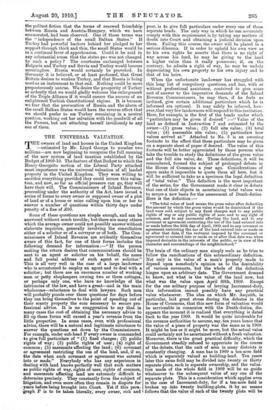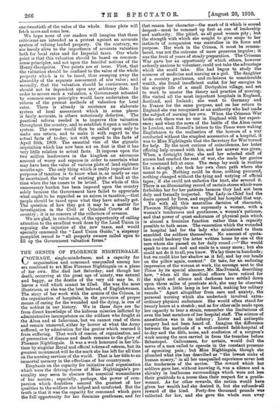THE - UNIVERSAL VALUATION.
Some of these questions are simple enough, and can be answered. without much trouble; but there are many others which the average owner could not possibly answer without elaborate inquiries, generally involving the consultation either of a solicitor or of a surveyor or of both. The Com- missioners of Inland Revenue are evidently themselves aware of this fact, for one of their forms includes the following demand for information :—" If the person making the return desires that communications should. be sent to an agent or solicitor on his behalf, the name and full postal address of such agent or solicitor." This is all very well in the case of a large landowner who is accustomed to employ an agent and to deal with a • solicitor ; but there are an enormous number of working men or petty shopkeepers owning two or three cottages, or perhaps only one, who have no knowledge of the intricacies of the law, and have a great—and in the main wholesome—reluctance to deal with lawyers. Such men will probably puzzle over these questions for days before they can bring themselves to the point of spending out of their scanty property the sum necessary to secure pro- fessional advice. It is no exaggeration to say that in many cases the cost of obtaining the necessary advice to fill up these forms will exceed a year's revenue from the little properties. In some cases, even with professional advice, there will be a natural and legitimate reluctance to • answer the questions set down by the Commissioners. For example, under sub-head P every owner is commanded - to give full particulars of " (1) fixed charges ; (2) public rights of way; (3) public rights of user; (4) right of -common ; (5) easements affecting the land ; (6) covenant or agreement restricting the use of the land, and, if so, the date when such covenant or agreement was entered into or made." Everybody who has any experience in dealing with land knows perfectly well that such matters as public rights of way, rights of user, rights of common, -and easements affecting land. are extremely difficult to determine precisely. - They constantly form the subject of litigation, and even more often they remain in dispute for years before being brought into ,Court. Yet if this para- graph P is to be taken literally; every owner, rich and poor, is to give full particulars under every one of these separate heads. The only way in which he can accurately comply with this requirement is by taking any matters of doubt into Court and obtaining a judicial decision upon them. Failing this course, the owner will be placed in a serious dilemma. If in order to uphold his own view as to his own rights he asserts that there is no right of way across his land, he may be giving to the land a higher value than it really possesses ; if, on the contrary, he admits a right of way, he may be unduly depreciating his own property to his own injury and to that of his heirs.
When the unfortunate landowner has struggled with this long list of compulsory questions, and has, with or without professional assistance, contrived to give some sort of answer to the imperative demands of the Inland Revenue Commissioners, he may then, if he feels so inclined, give certain additional particulars which he is informed are optional. It may safely be inferred, how- ever,that very few landowners will respond to this invitation. Here, for example, is the first of the heads under which "particulars may be given if desired" :—" Value of the land as defined in Instruction 7 and estimated by the owner—(1) gross value ; (2) full site value; (3) total value ; (4) assessable site value ; (5) particulars how values arrived at." Attached to No. 5 is an amusing footnote to the effect that these particulars may be given on a separate sheet of paper if desired. The value of this footnote will be better appreciated by those persons who take the trouble to study the definitions of the gross value and the full site value, &c. These definitions, it will be remembered, formed the subject of prolonged debate in the House of Commons a year ago. Considerations of space make it impossible to quote them all here, but it will be sufficient to take as a specimen the legal definition of "total value." This definition is the most important of the series, for the Government made it clear in debate that one of their objects in ascertaining total values was to secure a new basis for the assessment of Death-duties. Here is the definition :-
"The total value of land means the gross value after deducting the amount by which the gross value would be diminished if the land were sold subject to any fixed charges and to any public rights of way or any public rights of user, and to any right of common, and to any easements affecting the land, and to any covenant or agreement restricting the use of the land entered into or made before the 30th day of April, 1909, and to any covenant or agreement restricting the use of the land entered into or made on or after that date, if the restraint imposed by the covenant or agreement so entered into or made on or after that date was when imposed desirable in the interests of the public, or in view of the character and surroundings of the neighbourhood."
The brain of the ordinary man simply reels as he tries to follow the ramifications of this extraordinary definition. Not only is the value of a man's property made to depend upon somebody's opinion as to the desirability of various covenants, but the whole of the definition hinges upon an arbitrary date. The Government demand to know, not what is the value of the land now, but what was the value upon April 30th, 1909. Except for the one solitary purpose of levying Increment-duty, this information cannot possibly have any practical value whatsoever. The idea on which Mr. Asquith, in particular, laid. great stress during the debates in the House of Commons, that this new form of valuation would be serviceable in connexion with the Death-duties, dis- appears the moment it is realised that everything is dated back to the year 1909. It would be quite intolerable for the revenue authorities to assume, say, ten years hence that the value of a piece of property was the same as in 1909. It might be less or it might be more, but the actual value could certainly not be ascertained without a fresh valuation. Moreover, there is the great practical difficulty, which the Government steadily refused to appreciate in the course of the debate, that the unit of area in many districts is constantly changing. A man has in 1909 a ten-acre field which is separately valued as building-land. Ten years later this same field may be divided into twenty or thirty separatttots, each in separate ownership, and the valua- tion made of the whole field in 1909 will be no guide whatsoever to the subsequent value of any one of the separate plots. This is a consideration which applies even in the case of Increment-duty, for if a ten-acre field is broken up into twenty building-plots, it by no means follows that the value of each of the twenty plots will be one-twentieth of the value of the whole. Some plots will fetch more and some less.
We hope none of our readers will imagine that these criticisms are intended as a protest against an accurate system of valuing landed property. On the contrary, we are keenly alive to the importance of accurate valuation both for local rates and for Imperial taxes. Our whole point is that this valuation should be based on common- sense principles, and not upon the fanciful notions of the Henry-Georgeites. Two points are at issue. First, that the valuation should be confined to the value of the whole property which is to be taxed, thus sweeping away the absurdity of the separate assessment of site value ; and secondly, that the valuation should be continuous, and should not be dependent upon any arbitrary date. In order to secure such a valuation, a Government actuated by common-sense principles would have undertaken the reform of the present methods of valuation for local rates. There is already in existence an elaborate system of local assessment which in some places is fairly accurate, in others notoriously defective. The practioal reform needed is to improve this valuation throughout the country, and to establish it upon a uniform system. The owner would then be called upon only to make one return, and to make it with regard to the actual facts of to-day, not with regard to the facts of April 30th, 1909. The essential vice of the gigantic inquisition which has now been set on foot is that it has very little relation to actual facts. It imposes upon the two million landowners in the kingdom an enormous amount of worry and expense in order to ascertain what may have been the value of various plots of land eighteen months ago. The only thing which is really important for purposes of taxation is to know what is, as nearly as can be ascertained, the value of existing plots of land at the time when the tax comes to be levied. The whole of this unnecessary burden has been imposed upon the country solely because the Government have failed to appreciate what ought to be regarded as an axiom in taxation,—that people should be taxed upon what they have actually got. The question of how they got it may be a matter for investigation in the Civil or Criminal Courts of the country ; it is no concern of the collectors of revenue.
We are glad, in conclusion, of the opportunity of calling attention to the excellent work done by the Land Union in exposing the injustice of the new taxes, and would specially commend the " Land 'Union Guide," a sixpenny pamphlet issued to " all property owners called upon to fill up the Government valuation forms."







































 Previous page
Previous page